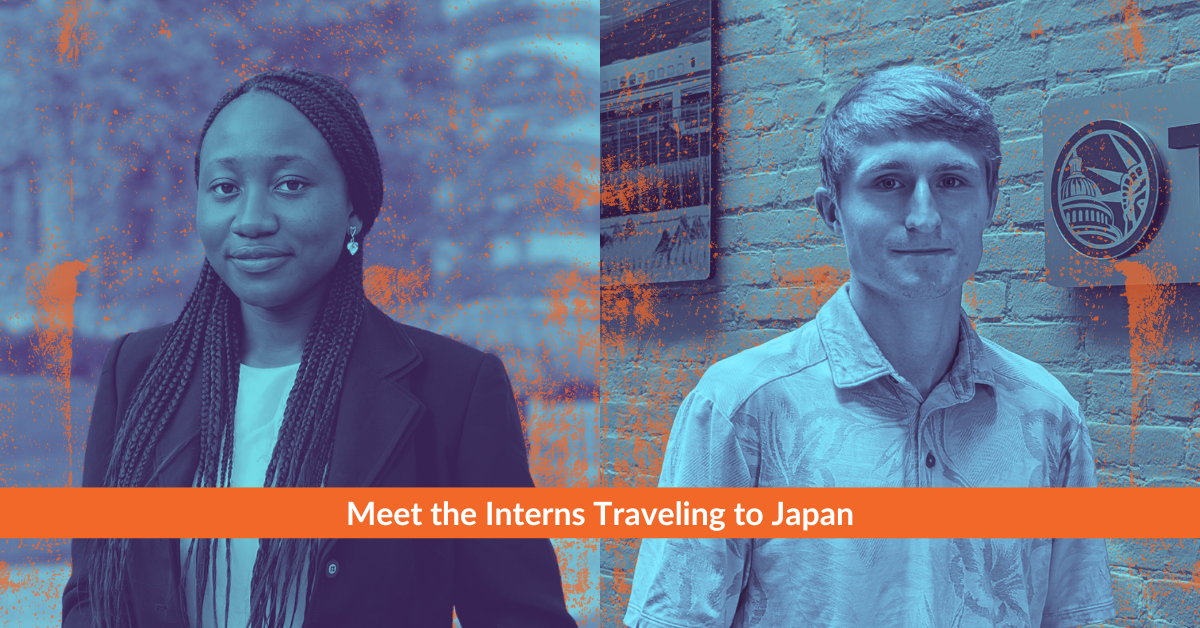Once again, Northeast Maglev has recruited two new Baltimore-Washington area university students for a once-in-a-lifetime internship opportunity. These interns will spend two weeks in Japan, where they will learn about Japanese culture and the company that first introduced high-speed trains to the world: the Central Japan Railway Company (JR Central).
We’re thrilled to introduce the next generation of SCMAGLEV enthusiasts!
Comfort Oshagbemi

Hometown: Gaithersburg, Maryland
School & Year: 2nd Year Graduate Student at the University of Maryland, College Park
Area of Study: International Relations
What inspired you to apply for an internship opportunity with JR Central?
I have always been fascinated by how transportation systems can drive economic growth and improve quality of life. Living in the DMV, I’ve seen how the Northeast Corridor, one of the busiest and most congested regions in the country, struggles with aging infrastructure, frequent delays, and overcrowded systems that affect millions of daily commuters. Seeing and learning about those challenges sparked my interest in finding ways to make transportation systems more financially viable and beneficial to the communities they serve. When I learned about JR Central and the SCMAGLEV project, I saw an opportunity to explore how an innovative high‑speed rail system can transform connectivity and regional development. This internship brings together many of my passions in economic policy, infrastructure, and international business, which is why it felt like such a natural fit.
What are you most excited to learn about or experience during this internship program?
I’m most excited to gain a behind‑the‑scenes understanding of how JR Central plans, operates, and finances high‑speed rail systems, and how those insights can inform transportation improvements in the U.S. I’ll learn directly from JR Central’s experts, seeing how technical and economic decisions are made and understanding the ‘why’ behind their operational model.
I’m also eager to experience the cultural side of the program. Stepping into a new environment and engaging with people from different backgrounds has a way of reshaping how you approach challenges. I look forward to visiting Japan, connecting with JR Central staff, and gaining cultural insights that will deepen my understanding of how infrastructure projects succeed in different contexts.
How will you apply your experiences to your future career path?
This internship will provide me with a unique perspective on how large-scale infrastructure projects can drive economic growth, which directly supports my long-term goal of working in economic policy. By learning how JR Central plans and finances high‑speed rail, I’ll gain practical examples of how economic policy decisions translate into real‑world development.
I’m also deeply interested in international relations, so experiencing firsthand how a leading global company operates and collaborates across borders will help me understand how international best practices can be adapted to projects in the U.S. and beyond.
These lessons in economic strategy and cross‑cultural collaboration will shape how I approach future roles where I analyze policies and advise organizations on projects that connect people and promote sustainable growth.
Jack Walker

Hometown: Frederick, Maryland
School & Year: 2nd Year Graduate Student at Georgetown University
Area of Study: M.S. in Environmental Metrology and Policy, B.A. in Chemistry from Harvard University
What inspired you to apply for an internship opportunity with JR Central?
I am very supportive of high-speed rail (HSR) and have been for quite some time. When I saw an opportunity to intern with JR Central, the HSR pioneers and lead innovators, I knew I couldn’t let it slip away.
From a policy standpoint, I was eager to learn about what local, regional, and national policies have enabled the extensive development of Shinkansen lines in Japan. My studies at Georgetown heavily revolve around the National Environmental Policy Act (NEPA) stages that infrastructure projects in the US must abide by in order to truly consider the environment in the planning and construction processes, and I wondered how NEPA compares to environmental regulations in Japan.
From a technical standpoint, I was incredibly interested in the superconducting magnetic levitation (SCMaglev) technology that JR Central is developing for its Chuo Shinkansen line. I’ve been curious about the chemistry that helps make such high speeds possible. Additionally, I wanted to learn more about the decarbonization and air emissions reduction benefits of HSR, both through JR Central’s reduction of car and air travel emissions but also through transitioning electricity inputs from fossil fuels to renewables.
What are you most excited to learn about or experience during this internship program?
I’ve never left North America before, so I am very excited to travel to Japan and experience Japanese culture first-hand. Additionally, I’ve learned a lot about JR Central’s business and technology through virtual meetings with their team, and now I am eager to see their day-to-day operations. It will be very interesting to compare the Japanese morning work commutes to those in America, given that we are so much more car-dependent.
How will you apply your experiences to your future career path?
I hope to work at the intersection of science and policy, using scientific measurements to help guide reasoned, informed policy decisions. Moreover, I want to work on projects that aid in decarbonization, energy transition, and environmental protection. Being able to shadow JR Central’s operations this summer, while also assisting The Northeast Maglev (TNEM) in its efforts to bring HSR to the Northeast Corridor, will certainly help me on that track.
So far at TNEM, I’ve been working with data from the Environmental Impact Statement (stage of NEPA), exposing me to the methods in which large-scale infrastructure projects must be assessed prior to construction. With JR Central, I want to learn as much about their use of data in operations, safety, innovation, and environmental compliance/protection.
The Future of Travel
After virtual sessions with experts from JR Central in June, Comfort and Jack will also join Northeast Maglev in our Baltimore office to meet our team and prepare for travel. In Japan, they will rotate through JR Central’s various business departments and experience an invaluable cultural exchange.
We look forward to welcoming our interns back to the United States. Keep an eye out on our blog and social media pages to learn more about their travels!
